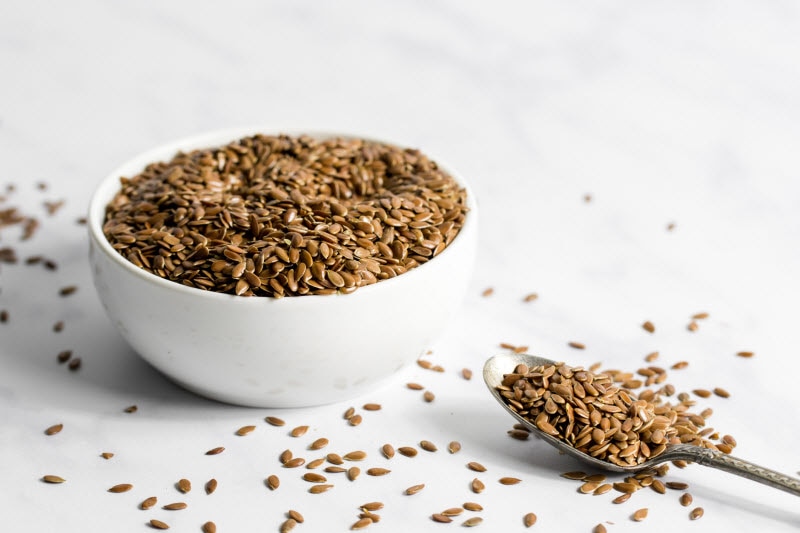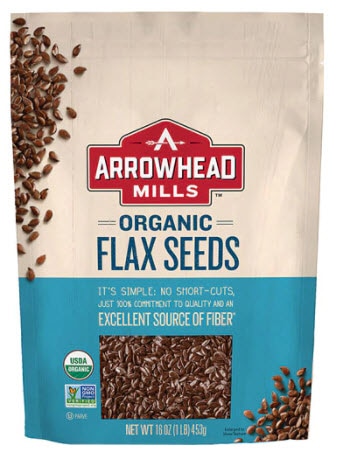Hailed by many as one of the most powerful plant foods on the planet,
flax seeds—chock full of omega 3 fats—support healthy blood sugar, blood pressure, and cholesterol levels. Flax seeds can also decrease overall inflammation, are great for skin, hair, immunity and brain health. But perhaps they are most known for being a hyper efficient source of fiber ground into a powder and added to smoothies or yogurt (excellent for preventing constipation). Here are seven science-backed benefits of this humble wonder seed.

The Health Benefits of Flaxseed
1. Helps with weight control
Flax’s high fiber and fat content make it an ideal dietary addition for those wanting to maintain their weight or lose weight. For the snackers amongst us, adding
flaxseed to your beverage to stave off hunger pangs by increasing feelings of fullness. A 2012 study found that adding 2.5 grams of ground flax fiber extract to a beverage reduced feelings of hunger and overall appetite, likely due to the soluble fiber content of flax seeds. Flax slows digestion in the stomach, which triggers a host of hormones that control appetite.
†
2. Supports the cardiovascular system
Flaxseed products appear to improve cardiovascular risk factors primarily by modestly improving lipid (fatty acid) profiles. Because flaxseed is rich in both alpha-linolenic acid (ALA) and lignans, flax also might modulate cardiovascular risk factors in other ways such as reducing oxidant stress. Lignans are plant compounds that have antioxidant and estrogen properties, both of which can help improve cardiovascular health. Interestingly, flax seeds contain up to 800 times more lignans than other plant foods, with sesame seeds coming in a close second.
†
 3. Maintains healthy blood pressure levels (already within normal range)†
3. Maintains healthy blood pressure levels (already within normal range)†
Several studies show that taking flaxseed daily can help lower blood pressure. In one study, for those who were already taking blood pressure medication, flax seeds lowered blood pressure even further and decreased the number of patients with uncontrolled high blood pressure by 17 percent.
†
4. Reduces blood sugar levels (already within normal range)
Due to their high fiber content, flax seeds are a
low-glycemic food. Instead of spiking blood sugar levels, flax seeds cause them to rise steadily, promoting blood sugar control. The fiber in the seeds slows down the release of sugar into the blood. A few studies have found that people with type 2 diabetes who added 10–20 grams of
flaxseed powder a day to their diet for at least one month saw reductions of 8–20 percent in blood sugar levels.v
5. Lowers cholesterol
Flax oil, rich in unsaturated fats, is one of the healthiest oils. Research has repeatedly shown that flax oil support “good” (HDL) cholesterol. Flax oil can be mixed into foods. (But note that flax oil breaks down under high temperatures, so it shouldn’t be used for cooking.) In a 2014 study, people with high cholesterol who consumed 3 tablespoons (30 grams) of roasted flaxseed powder daily for three months, lowered their total cholesterol by 17 percent and “bad” LDL cholesterol by almost 20 percent.
†
How does this work? The fiber in flax seeds binds to bile salts and is then excreted by the body. To replenish the bile salts, cholesterol is pulled from your blood into your liver, thus lowering your blood levels of cholesterol.
†
 6. Helps protect cellular health†
6. Helps protect cellular health†
According to the University of Texas MD Anderson Center, “Some studies have shown that consuming 25 grams of flaxseed a day may reduce tumor growth in breast and prostate cancer. It can also reduce the body's production of estrogen, so its benefits have been linked to breast cancer prevention.” Several observational studies show that women who eat flax seeds have a lower risk of breast cancer, particularly postmenopausal women. One study found that women who eat flax seeds are 18 percent less likely to develop breast cancer. Men can also glean the benefits of flax seed consumption. A 2014 study found that flaxseed might help maintain overall prostate health and reduce the risk of an enlarged prostate.
†
7. Encourages healthy, regular bowel function
Last but not least, just one tablespoon of flax seeds contains 3 grams of fiber, which is 8–12 percent of the daily recommended intake for men and women, respectively. Flax seeds contain two types of dietary fiber: soluble (20–40 percent) and insoluble (60–80 percent). The bacteria in the large bowel ferments this dynamic fiber duo, which then bulks up stools and results in more regular bowel movements.
†
If you are constipated, boiling flax seeds into a tea makes a wonderful laxative that is moistening and non-irritating. This is an old German remedy for constipation associated with dry, hard stools. Simply mix 2 tablespoons of
flax seeds in 4 cups of boiling water, simmer on low heat and strain. The tea is quite thick and slippery, almost like syrup, and you can flavor it with honey or stevia. Drink a few cups a day and experience how well it supports your natural healthy digestion as well as other minor stomach or digestive pains.
†These statements have not been approved by the Food and Drug Administration. These products are not intended to diagnose, treat, cure or prevent disease.





 3. Maintains healthy blood pressure levels (already within normal range)†
3. Maintains healthy blood pressure levels (already within normal range)† 6. Helps protect cellular health†
6. Helps protect cellular health†